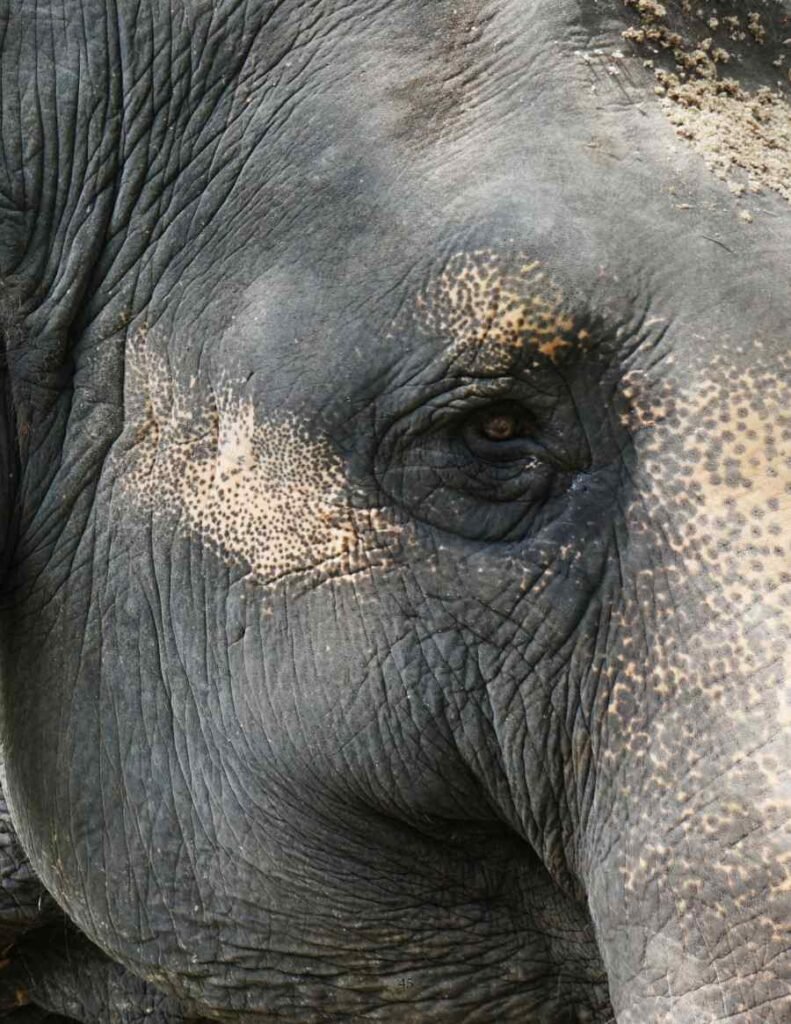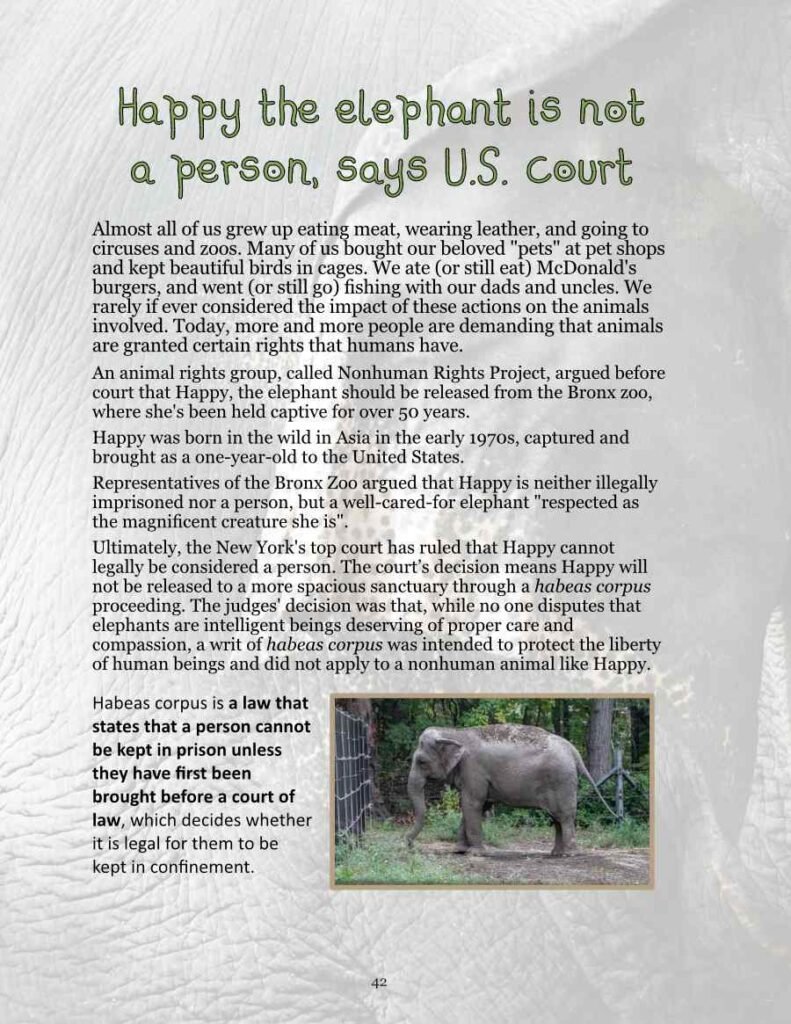We treat animals as legal objects. We should treat them as legal subjects instead.
You may believe that the law protects animals from harm in the United States, but that belief is false. There are few meaningful legal protections for most animals, and little if any enforcement of the laws that exist. The Animal Welfare Act, which is the main federal animal welfare law in the United States, exempts farmed animals, who represent about 98% of all captive animals in the country. So, while some animals, such as companion animals, enjoy limited protections, other animals mostly do not. Many state laws exempt farmed animals as well. This means companies and individuals can treat animals as they wish, as if those laws didn’t exist at all.
A deeper, related problem is that we classify nonhuman animals in the United States as legal objects, without the capacity for legal rights. This legal classification supports systematic neglect, exploitation, and massive killing and mutilation of animals on farms, in science and school labs, through hunting and fishing, as well as imprisoning the animals in zoos and circuses, taking away and destroying their habitats through practices such as deforestation, pollution, and the wildlife trade that harm humans and non-humans alike.

Happy the elephant is not a person, says U.S. court
Almost all of us grew up eating meat, wearing leather, and going to circuses and zoos. Many of us bought our beloved “pets” at pet shops and kept beautiful birds in cages. We ate (or still eat) McDonald’s burgers, and went (or go) fishing with our dads and uncles. We rarely if ever considered the impact of these actions on the animals involved. Today, more and more people demand that animals are granted certain rights that humans have.
An animal rights group, called Nonhuman Rights Project, argued before court that Happy, the elephant should be released from the Bronx zoo, where she’s been held captive for over 50 years. According to the activists, Happy is “an autonomous, cognitively complex elephant worthy of the right reserved in law for a person.”
Happy was born in the wild in Asia in the early 1970s, captured and brought as a one- year-old to the United States. Representatives of the Bronx Zoo argued that Happy is “neither illegally imprisoned nor a person”, but a well-cared-for elephant “respected as the magnificent creature she is”. And the New York’s top court has confirmed it, ruling that Happy cannot legally be considered a person.
The court’s decision means Happy will not be released to a more spacious sanctuary through a habeas corpus proceeding. The judges’ decision was that, while no one disputes that elephants are intelligent beings deserving of proper care and compassion, a writ of habeas corpus was intended to protect the liberty of human beings and did not apply to a nonhuman animal like Happy.
Habeas corpus is a law that states that a person cannot be kept in prison unless they have first been brought before a court of law, which decides whether it is legal for them to be kept in confinement.


Why is there a problem with giving animals legal rights and treating them as legal persons?
Many people, including the judges, fear that giving animals rights will open the door to legal actions on behalf of other animals, including pets, animals on farms, in science labs, circuses, and in zoos, and “would have an enormous destabilizing impact on modern society”.
Unfortunately, those who benefit from the current system of abuse and exploitation are not giving in without a fight. Animal farming is a huge multibillion dollar industry, fiercely protected by those who benefit from it. And most of us willingly participate in this system by buying and using animal products, without giving it any thought.
Most of us are completely unaware of the abuse of animals that lies behind the food we eat and other products that we use that involve animal abuse and suffering, and we prefer to stay that way. We don’t want to see what’s behind the closed doors of animal farms, testing labs, zoos, or circuses with animal acts. The biggest abuses are happening on animal farms, with billions of animals being bread for the sole purpose of killing them. Eating meat, eggs, milk, or cheese is the end of a long process completely hidden from public view.
Most of people never associate a neat plastic package or aromatic dish with as living, breathing, and suffering animal. Product labels, ads, and television commercials show us animals happily grazing in green pastures, and frolicking in the sun, which is completely false reality compared to the horrors which these animals endure for their entire lives. But most of us never question them.
Although the Nonhuman Rights Project has lost this case and other similar cases, they are not giving up. The ruling from New York’s highest court cannot be appealed, but two judges wrote separate dissents, pointing out that the fact that Happy is an animal does not prevent her from having legal rights. They stated that Happy was being held in “an environment that is unnatural to her and that does not allow her to live her life” and that “her captivity is inherently unjust and inhumane. It is an affront to a civilized society, and every day she remains a captive—a spectacle for humans—we, too, are diminished”. The fact that they managed to persuade these judges to their arguments, is a great reason for hope.
All animals matter. They have an inherent worth, a value completely separate from their usefulness to humans.
Every creature with a will to live has a right to live free from pain and suffering.
Most of us would agree that animals are not objects, but living beings. It is obvious to us that all animals have the ability to suffer; that they have the capacity to feel pain, pleasure, fear, frustration, loneliness, and motherly love. This means that they matter morally, and whenever we consider doing something that would interfere with their interests, we are morally obligated to take them into account.
Animal use is so deeply ingrained in our culture, and some of us can’t even imagine what our lives would look like if things were different. But we cannot heal our civilization and our planet without improving our relationship with the animals and the entire natural world.
Things are already beginning to shift for the animals. For example, in Spain, animals have already been granted the status of “sentient beings”, and will no longer be considered as “objects” by the law, and as such will have a different legal standing than an inanimate object.
Millions of people switch to plant-based diet and choose the vegan lifestyle for the animals and the planet. Veganism is a way of living that attempts to exclude all forms of animal use, whether for food, clothing, entertainment, or any other purpose. That’s why a vegan diet eliminates all animal products, including meat, eggs, and dairy.
Initiatives, such as the Plant Based Treaty, the Half Earth Project and 30 by 30 Goal, are attempting to improve the situation for all animals, heal the planet, and reverse the climate change. Each and every one of us can help in making this change happen. Plus, we can all become herbivores for the animals and the planet.
Because if not us, then who? If not now, then when?

